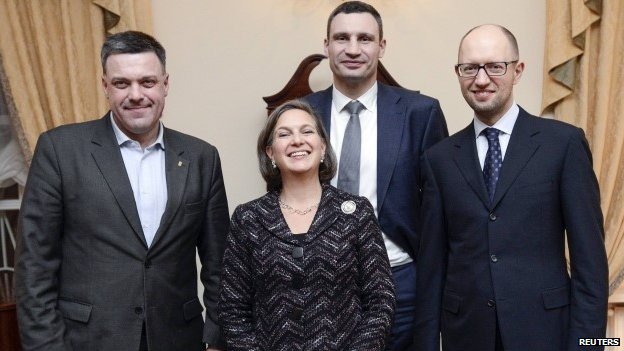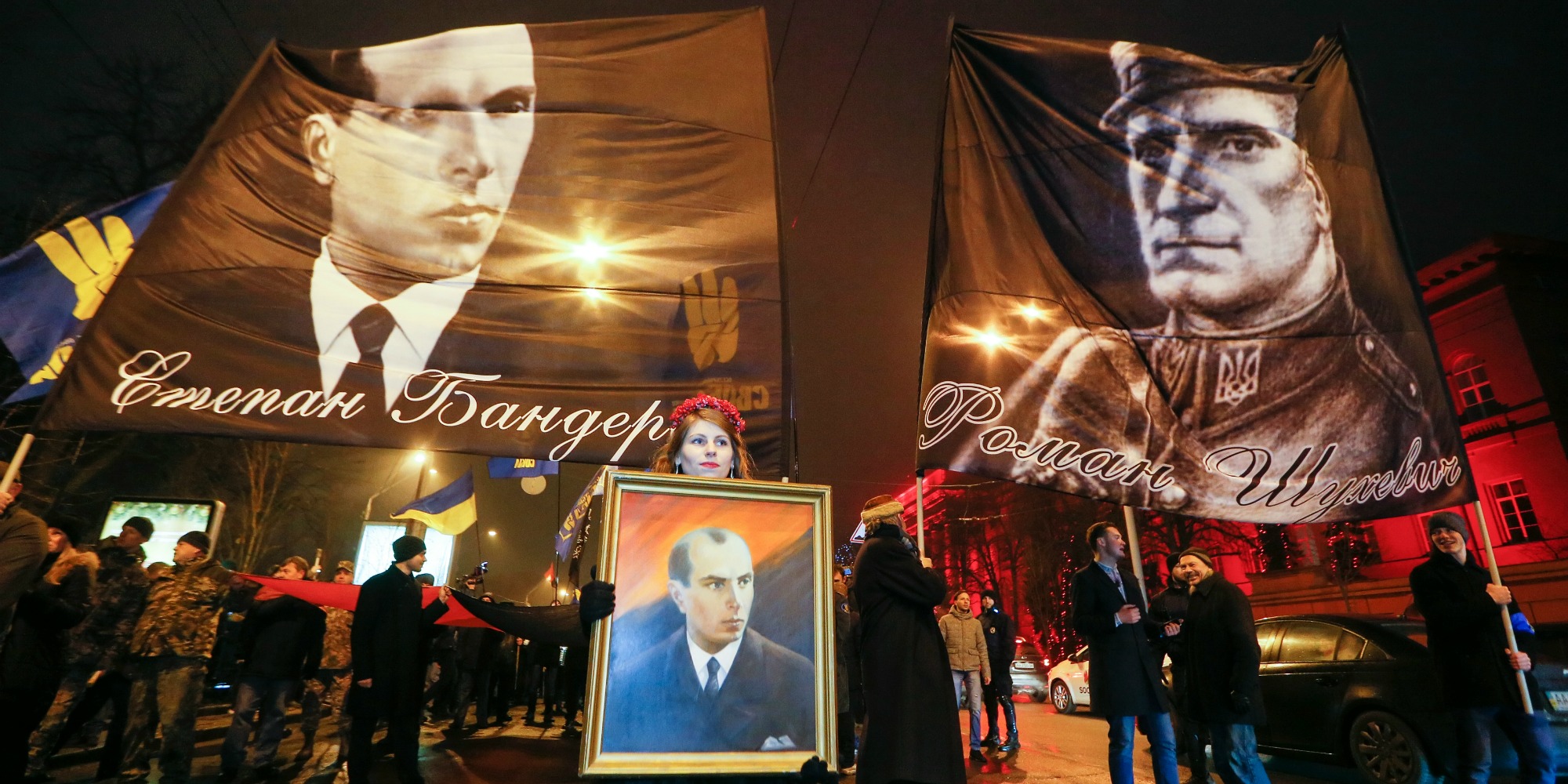
Views: 2343
The events which led to the 2014 coup in Ukraine are generally blamed on anti-Russia actors, including the United States and EU.
Russia’s Foreign Minister Sergey Lavrov was recently in the EU where he said the following,
“The largely-provoked-from-the-outside Ukrainian crisis has become the direct consequence of such short-sighted policy of Washington and Brussels”.
He continued,
“We hope that Germany and France, as partners within the Normandy format, as well as the US who have a special influence on the Kiev establishment, will use their means to change the situation”.
Lavrov went on to define his hopes for Ukraine stating,
“We want to see Ukraine a stable country, where all minorities, including linguistic, religious and ethnic, live freely and exercise rights provided by international convention”.
It is widely known that the US, EU, and fascist radicals mainly from the former Polish regions of Galicia were in favour of the EU Association Agreement proposed for Ukraine. Ukraine’s President at the time and the last legitimate leader of the country, Viktor Yanukovych decided against the association agreement with Europe, preferring to leave options open which would allow Kiev to continue to do commerce with its traditional partner, Russia.
But beyond Russia, Yanukovych’s Ukraine was also cultivating other partners even further away from the EU. Could this be part of the reason he was illegally overthrown?
The following timeline of events is crucial in understanding how anti-Chinese sentiments among the EU, US and Ukraine’s fascists could have played as much of a role in fomenting the 2014 Ukrainian coup as did those of anti-Russian actors.
October 2013:
The plans for China’s One Belt–One Road initiative, also called Belt & Road or The New Silk Road initiative were officially announced by Chinese officials in September and October of 2013. The announcements were made in part by Chinese Premier Li Keqiang, including during his international visits.
December 2013:
Ukraine’s President Viktor Yanukovych visits China where he met with Chinese President Xi Jinping. During the meetings which were uniquely successful for Ukraine, China agreed to invest $8 billion into the Ukrainian economy.
RT reported the following on 5 December 2013,
‘Ukrainian President Yanukovych left Kiev in search of foreign cash for his country’s near bankrupt economy, and now he says he’s secured $8 billion in investment from China.
The money has made a timely arrival in cash-strapped Ukraine’s hands, as the economy teeters on default and faces debts over $15 billion. Yanukovych is on a three-day planned working trip to China.
“The documents signed today expand our economic cooperation. We have not yet calculated how much this will make up in terms of money, but we made some calculations earlier and saw that the matter is about some $8 billion in investments coming to the Ukrainian economy,” Yanukovych said after signing a number of bilateral documents in Beijing on Thursday, quoted by Interfax.
More investment documents are in their final stages of preparation, and are expected to be signed soon’, he said.
China has already given Ukraine $10 billion in loans, Reuters reported, citing VolodymyrFesenko of Ukraine’s Penta think-tank.
While Yanukovych signed papers in Beijing, a Ukrainian delegation met with Russian government officials in Moscow, including Prime Minister Medvedev to discuss trade issues such as customs clearance, Ukrainian chocolate, meat and dairy products, and railways.
Protests broke out in Kiev over Yanukovych’s last minute rejection of an EU trade deal in favor of restoring economic talks with Russia, Ukraine’s top trading partner and energy supplier.
Ukraine hasn’t made a decisive step East or West, and for now seems to be shopping around for the best economic deal to bring calm to markets, bond prices, and opposition movements, before committing to either the EU or Russia”.
During the meeting in Beijing, it was reported that Yanukovych and Chinese officials were in talks to construct a deep water port in Crimea, which at the time was under the sovereignty of Yanukovych’s government. The port project said to be worth $10 million, was reported shortly after the Ukrainian coup of February 2014 by the notoriously liberal Moscow Times as well as in a deeply Sinophobic article in the Eurasian Daily Monitor.
The way these publications – which clearly adopt a European narrative of events – reported Yanukovych’s dealing with China, clearly indicate that pro-EU propagandists were highly troubled by the fact that Ukraine under Yanukovych and China were about to solidify what might have been long lasting and meaningful economic relations, relations which could have helped ease Ukraine’s monumental debt crisis. If the debt crisis was resolved through Chinese investment, western creditors and the IMF would not have been able to wield power over Kiev.
The fact that Yanukovych travelled to Russia shortly after his trip to China is a further confirmation of the fact that doing business with both Russia and China is mutually complimentary. Russia’s subsequent enthusiasm for China’s New Silk Road is a further indication of the open possibilities of countries and businessmen conducting commerce with both Beijing and Moscow simultaneously.
The same could not be said of the proposed Ukraine-EU association agreement which would have effectively shut Ukraine out of the wider world market and forced the poor country to trade virtually exclusively with the EU. Any extra-EU trade would have had to be conducted according to the EU’s very strict rules which have constrained Greece’s economic ties to countries outside of Europe and which in part provoked Britain’s recent vote to leave the EU.
Under the post-coup regime, Ukraine has signed up to the deal with the EU in spite of fading enthusiasm from Europe. The western powers nevertheless successfully cut Ukraine off from its historic Russian homeland and its eastern partners.
February 2014:
Viktor Yanukovych and his country never got to see the fruits of his deals with China from December of 2014 because on 20 February of that year, Yanukovych was overthrown in a coup.
As The Duran recently explained,
“The EU was supposed to be the last minute saviour of Ukraine as fascist street-fighters and foreign mercenaries with fresh injections of American money readied a violent coup.
It was on the 20th of February 2014 that the Foreign Ministers of EU member states France, Germany and Poland convened in Kiev to broker a deal that was supposed to bring stability. Instead, it brought about a genocidal war on the people of Donbass who shortly after the coup declared their independence from the young fascist regime in Kiev. The deal also brought wide scale corruption in an already deeply corrupt place as well as total economic collapse that continues to get worse by the day.
Most ominously, the then Polish Foreign Minister who helped broker the deal which the insurgents had no intention of keeping, told representatives of the radicals that if they did not sign the agreement “you’ll all be dead”.
The truth is that the death came and continues to come not from those who opposed the coup but from those who came to power as a result of the coup.
The deal was supposed to insure orderly early elections and constitutional reforms which ironically reversed those made by Viktor Yanukovych. Instead, the agreement merely caused the total collapse of the state as the mob eventually forced Yanukovych to flee to Russia after a temporary and in hindsight, eerie pause in the violence.
The hours in the evening of the 20th of February 2014 in which violence temporarily abated have been made up for by three and a half years of violence, turmoil and a humanitarian disaster which has seen the lawless regime in Kiev drop chemical weapons on the people of Donbass, all while the west remains silent”.
Subsequent to the coup, the new regime broke off economic relations with Russia and scarpered the deals with China.
Today:
The routes of China’s New Silk Road still plan on partly travelling through Ukraine, but the current regime in Ukraine will doubtlessly make such matters more difficult for China vis-a-vis the last legitimate government of Ukraine, that of Viktor Yanukovych.
Although more recent maps show a slightly different route of the New Silk Road, which still goes through Ukraine, as early as 2013 (just prior to the coup in Kiev), maps showing proposed routes of the Road clearly indicated that Ukraine was on China’s map.
There are two maps from 2013 followed by a more recent map:
Eurasia including Russia and much of modern Ukraine are included in what British thinker Halford John Mackinder called the Pivot Area in his theory which posited that Eurasia including and especially Russian Imperial lands needed to be conquered and subdued by the west in order to attain geo-political dominance over Asia and what one might now call the Global East or New Global South.
Far from being discarded, Mackinder’s theories continue to prove to be a guiding force behind the west’s policies of war, occupation and provocation against the countries which occupy his ‘pivot area’. Indeed, Britain and France’s continued opposition to Russia in its wars with Turkey throughout the 19th century go a long ways in explaining that far from being original, Mackinder simply wrote a theory which largely conformed to late modern western military and geo-political practice.
Drawing Ukraine away from its historical fraternal Eurasian partners in Moscow and into a western bloc of nations, the EU, was clearly an attempt to draw a portion of Mackinder’s pivot area into the western sphere of political sovereignty.
When understood from this perspective, the proximate timing of Viktor Yanukovych’s visit to China in late 2013, China’s unveiling of the New Silk Road in autumn of 2013 and the pro-EU coup in Kiev in February of 2014, seems more than coincidental.
China is attempting to build a New Silk Road from east to west based on cooperation and a respect for the sovereignty of the nations along the road. Meanwhile, the west is using modern slogans to justify its old policies that never went away.
Originally published on 2017-08-16
Author: Adam Garrie
Source: Global Research
Origins of images: Facebook, Twitter, Wikimedia, Wikipedia, Flickr, Google, Imageinjection & Pinterest.
Read our Disclaimer/Legal Statement!
Donate to Support Us
We would like to ask you to consider a small donation to help our team keep working. We accept no advertising and rely only on you, our readers, to keep us digging the truth on history, global politics and international relations.










